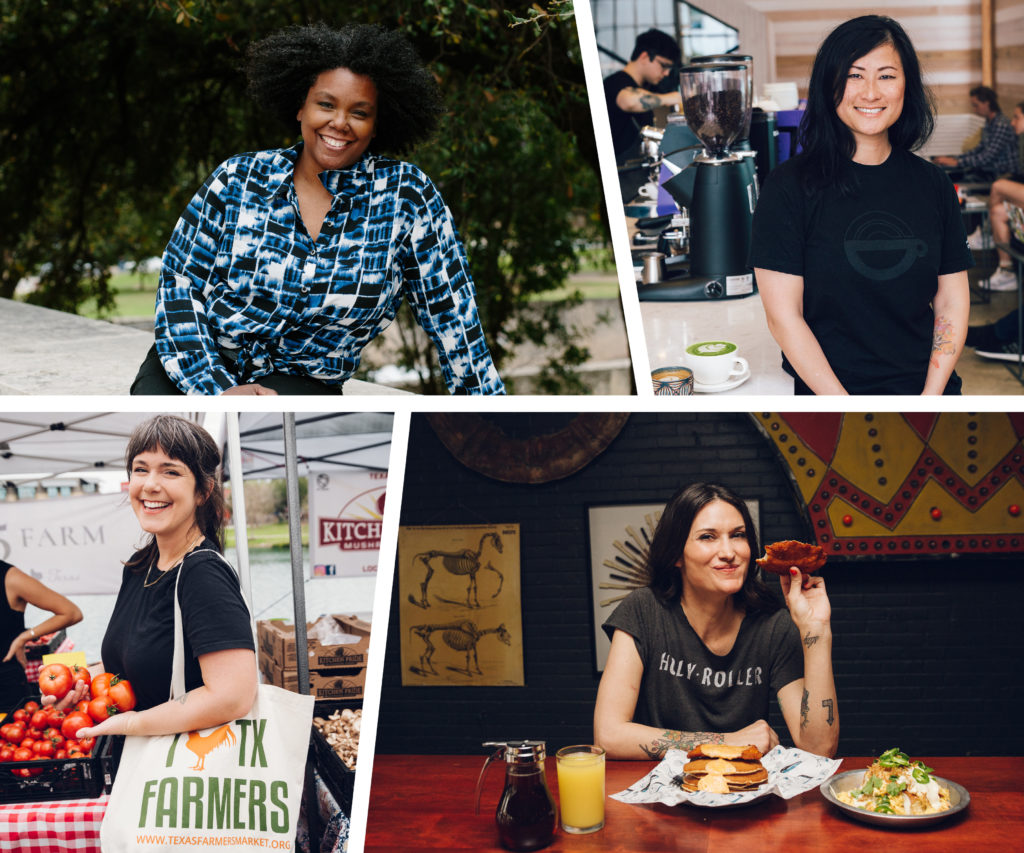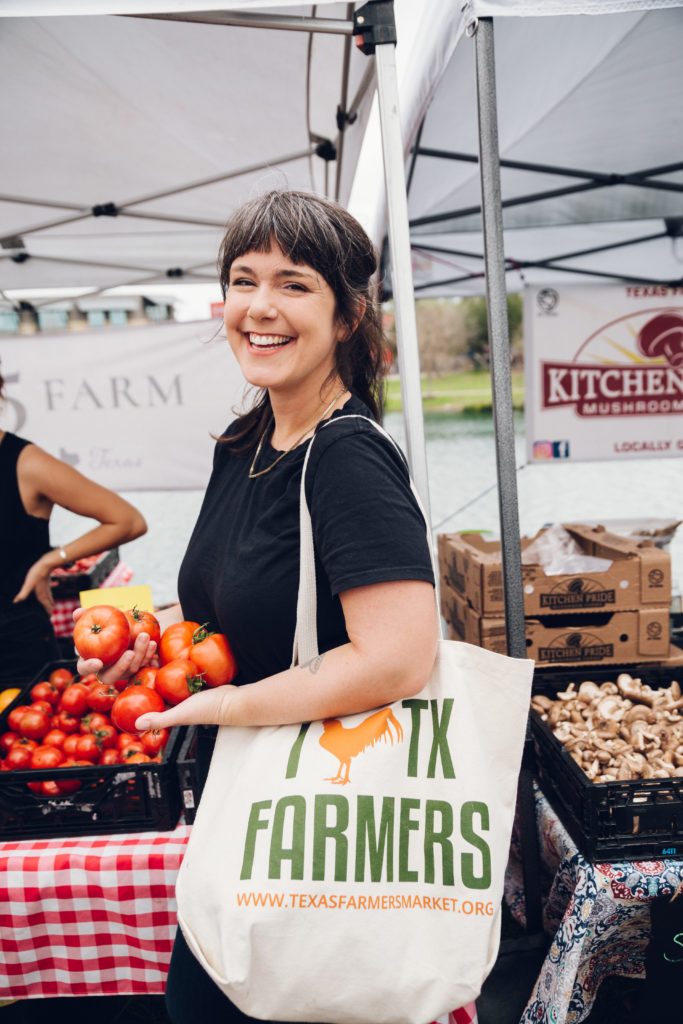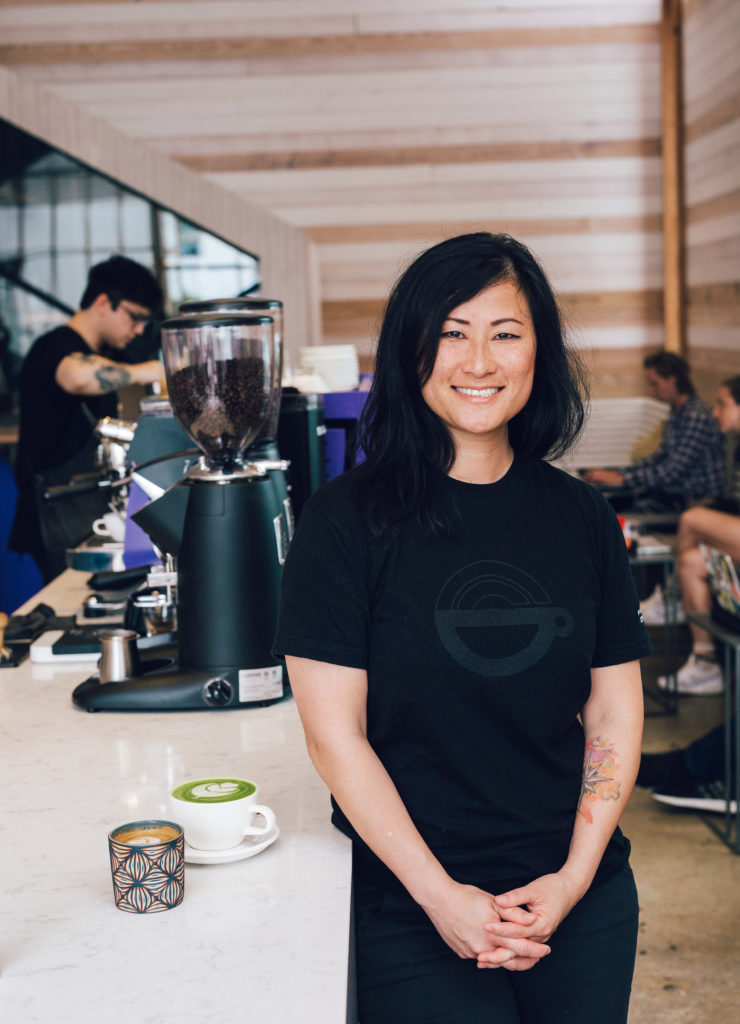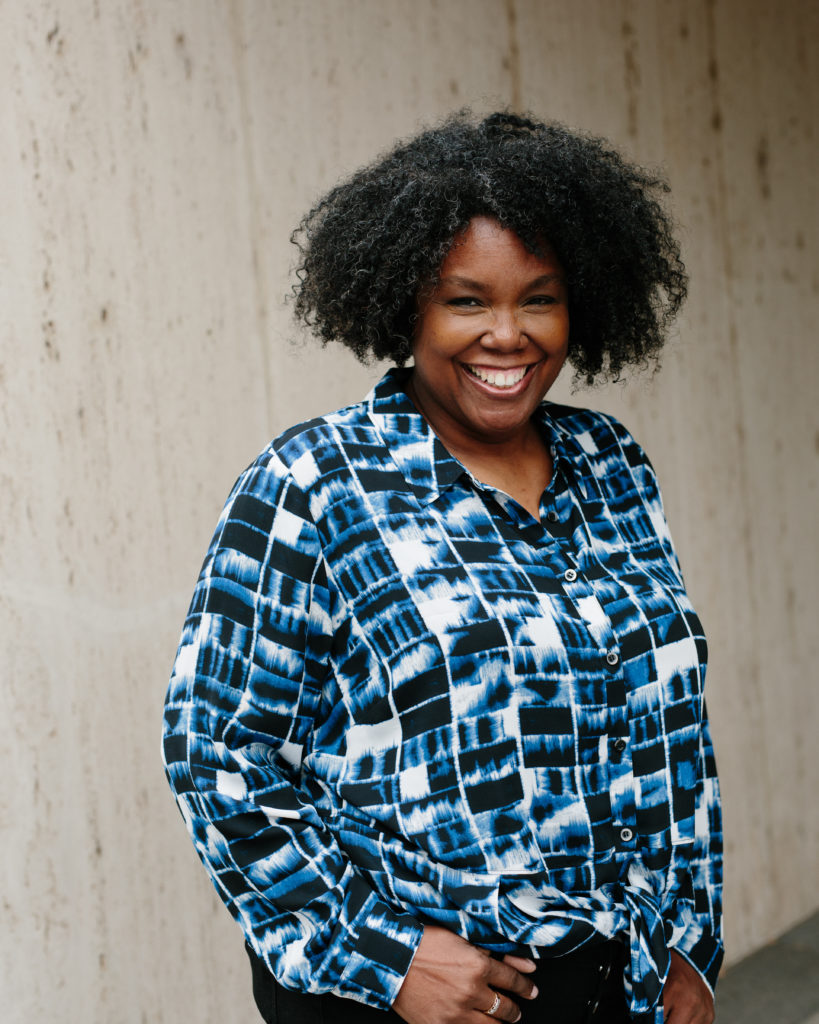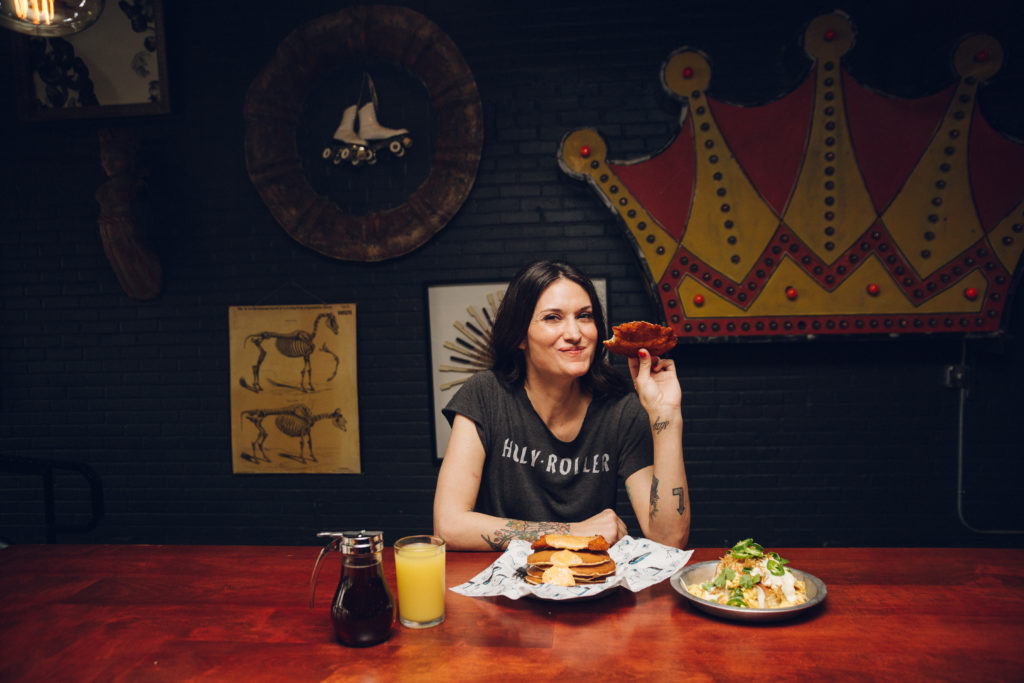Nora Chovanec, Khanh Trang, Hope Green and Callie Speer prove that food and social good make for the perfect recipe.
By Regine Malibiran, Photos by Riley Blanks
Food connects us as humans. It’s a source of energy, enjoyment and nostalgia, and in Austin, four women are using food to enact real change in their communities. Through produce, coffee, grilled cheese and honey-buttered biscuits, these women are channeling their passions to come alongside their fellow Austinites and build lasting support systems.
Nora Chovanec
Deputy Director of the Texas Farmers Market
Nora Chovanec has loved local, seasonal food since she was a young girl in her hometown of Corvallis, Oregon.
“I grew up going to farmers markets with my mom,” Chovanec says. “I still remember the couple who wore straw hats that we bought our eggs from.”
As the deputy director of the Texas Farmers Market, Chovanec combines her love for food and the environment with her background in marketing and design to tell stories about local food, sustainable farming and animal-rearing.
“Not all farmers markets are the same,” Chovanec says. “One of the things that’s really important to us at Texas Farmers Market is that we’re a producer-only market, which means that anybody who sells at our markets has to have grown all the produce that they’re selling. Every person who sells meat at that market has to have humanely raised that animal from birth on their farm with no antibiotics.”
Chovanec leads communications and design while also personally inspecting all the farms and ranches that sell at the market. When it comes to marketing sustainable food, Chovanec strives to make sure Texas Farmers Market always keeps its word and maintains high standards. Having such close contact with its farmers and agricultural producers fosters her deep love for the natural bounties of Central Texas and frequently reminds Chovanec why their work is crucial for environmental sustainability.
“Beef has been getting a bad rap in terms of environmental conservation these days. I 100 percent agree that factory-farmed, corn-fed beef is bad for the environment and bad for the people eating it,” Chovanec says. “But I work with ranches in Central Texas where cattle have existed for thousands of years prior to becoming domesticated. In order to have healthy grasslands that regenerate seasonally, you need animals to eat the grass and then move to another area and allow the grass to grow. You can raise cattle in a way that, done correctly, [it] can be good for the environment.”
2020 is Texas Farmers Market’s 10th anniversary, and to commemorate the milestone, Chovanec is designing posters highlighting the work of its farmers and ranchers.
“When I’m designing each poster, I always smile,” Chovanec says. “I know all these people and the incredible work they’re doing on their land. I feel so happy to be able to use my skills to promote the things they’re working toward.”
Chovanec’s genuine zeal for community and doing the right thing—even if it’s inconvenient— shines brightly through her work and personality.
“I believe in inspiration,” she says. “I believe in passion; I believe in hope and working with people.”
What Motivates You?
“At my core, I do this work as a deep environmentalist. I really see all the ranchers and farmers that we work with as not just people who feed our community but they’re also on the front lines as stewards of our environment.”
Khanh Trang
Co-owner of Greater Goods Coffee Co.
Given the abundance of coffee and coffee shops in the city, it’s fair to say that the small yet mighty bean runs the lives of many Austinites. For Khanh Trang, coffee doesn’t just run her life; it is her life.
Trang, the co-founder of Greater Goods Coffee Co., had her first coffee-inspired “aha!” moment in 2009.
“I used to drink really, really dark coffee,” Trang says. “But I stumbled upon a coffee shop one day [where] the barista brewed me a Peru. It was a medium roast and I’d never had a cup of coffee where I could drink it black and taste all the flavors.”
She was inspired again during a trip with her husband (and co-founder), where they serendipitously stayed at a hotel next to Portland, Oregon’s annual coffee expo. They decided to check it out and immediately she was “mind blown.”
“Every possible person that could possibly touch coffee was there,” Trang says. “That was the moment when the light bulb turned on. Maybe I didn’t have to own a coffee shop, but I could do every other thing.”
After being inspired by her coffee experiences, Trang tried to find a job as a roaster. However, at the time, she was hard-pressed to find anyone teaching or hiring for the craft. Where there wasn’t a path, Trang blazed her own.
Greater Goods started in 2015 as a roastery and training center with the intent to make the career more accessible to more people. Greater Goods’ values of sustainability, charity, education and excellent customer service are evident in every level of the business.
One of the ways that Greater Goods exemplifies its values is by giving back to four local charities: Central Texas Food Bank, Autism Society of Central Texas, Boys & Girls Club of the Austin Area and Austin Pets Alive! For each bag of coffee sold, Greater Goods donates to one of these organizations. Purchasing one bag of coffee can supply up to three meals for a person in need or fund a day of support for at-risk animals.
“These charities are very close to our hearts,” Trang says. “Autism Society hits close to home because both sides of our families have been affected. With Boys & Girls Club, we just grew up with no money. [My husband and I] don’t need a lot so whatever we can, we just give back.”
Trang takes her role as the head of quality control seriously—not just in their roasting processes but in her leadership. Regulars and newcomers alike can feel assured that their coffee is not only delicious but also ethically supports both the farmers that grew it and their communities.
What Motivates You?
“Being an immigrant and having both parents work really hard instilled that work ethic in me. I’m not afraid of the hard work and the long hours. I also have my staff’s livelihood to think about. I can’t be afraid of failure.”
Hope Green
Owner of Emojis Grilled Cheese Bar
When Hope Green opened Emojis Grilled Cheese Bar, she did so out of necessity. After the 2008 recession cost Green her real-estate business, she needed to find a sustainable way to provide for her 9-year-old daughter.
“People were waiting for the market to come back up,” Green says. “By the time we realized that it wasn’t, I had used all my savings just trying to stay afloat. Banks weren’t really ready to help so I ended up losing my house.”
A native Texan, Green relocated to Austin with her daughter for a fresh start. Relatives housed them but Green knew that consistent couch surfing (sometimes separately) wasn’t what she wanted for her daughter’s childhood. But when she attempted to find a job after being self-employed, she faced significant challenges.
“Recruiters would tell me, ‘You haven’t been working for 16 years so it’s going to be hard for us to sell you,’” Green says. “But I had built a company with 2,300 employees! That was the most ludicrous thing I’d heard. It set the stage for what my expectations would be like trying to find work in Austin.”
The corporate world closed off to her, Green leaned back into her entrepreneurial spirit. She brainstormed with her daughter, who provided her with some helpful insight.
“She told me, ‘You know, if you sold food, you’d probably sell something every day,’” Green says. “Once it was out in the universe I wondered if I could actually do that.”
Emojis Grilled Cheese Bar started off at farmers markets. The business quickly grew in popularity and some of Green’s first customers encouraged her to charge more than just five dollars for her generously sized sandwiches. Soon, Green found herself needing to hire more staff, which led her to providing resources and employment for homeless youth.
“When the truck was downtown, there was this young lady that would just hang out. Eventually I told her to come help me,” Green says. “Just talking with her, I would learn more about her. Being a teenager, estranged from your parents and still trying to make your way in the world is such a weird state of limbo.”
Having experienced homelessness herself, Green was quick to explore how to help her staff. She started researching organizations that provide support for homeless and underserved youth. She’s currently developing a culinary curriculum to assist teenagers leaving juvenile detention with their education and employment. With the ultimate goal of creating a path toward self-sufficiency, Green proudly considers herself a “second chance employer.”
“No matter what your goal is, there are three or four pathways to get there,” Green says.
Former Emojis employees have started their own businesses since leaving the food truck. By taking the time to learn how to best provide for the underserved in her community, eliminating barriers to success and dishing out tough love when needed, Green exemplifies strength through severe adversity and the beauty of paying success forward.
What Motivates You?
“I don’t like that money is the measure of success. I want us to have a more socially conscious way of measuring success. I want us to get to a point where we say, ‘Your company is successful because you got 23 home- less teens off the street,’ and to see that as better than making $23 million.”
Callie Speer
Owner and Executive Chef at Holy Roller
Callie Speer, the executive chef and owner of Holy Roller, has worked in Austin restaurants since she was 16. Working her way up through the ranks of the restaurant industry from a young age taught Speer invaluable lessons and skills. But it also exposed her to the industry’s high-stress culture and unhealthy coping mechanisms.
“Looking back at it, I knew I drank a whole lot more than what is the norm,” Speer says. “My lifestyle didn’t seem weird to me at the time because everyone else was doing the same thing.”
A 2015 study by the Substance Abuse and Mental Health Services Administration found that the restaurant industry ranks as one of the highest in terms of heavy alcohol use in the United States. For Speer to break the cycle, it took some self-awareness and a lot of tough love.
“I came into work one day and one of my friends was mad at me,” Speer recalls. “I asked him, ‘What’s your problem?’ After a bit of poking and prodding he’s like, ‘You’re my problem. It sucks to work with you. All these women have the opportunity to work with you and that’s why they’re here. This is the version of yourself that you’re giving them?’ ”
Though it was incredibly hard to hear, ultimately that conversation became one of the main reasons why Speer decided to make some major changes in her life. She went to a rehabilitation facility for a month to help her get and stay sober. Afterward, she knew that she couldn’t just jump back into the same lifestyle and environment that led to her struggles in the first place.
Holy Roller came at a fortuitous time in Speer’s career. She knew she wanted to create a different culture than what most people in the industry were familiar with, which led to hiring women for leadership roles in her restaurant and creating an affirming space for recovery.
“Our kitchen manager is in recovery and he has shocked and awed me at how loyal and hard-working he is,” Speer says. “I’m watching him build this life for himself that he didn’t have before and it’s incredible to [witness].”
Speer is always thinking about “how to be of service to other people” and “how to do the next right thing.” She’s dedicated to progressing the work for herself, for her staff and for others. Besides running her own restaurant, Speer is also on the board of Heard, a nonprofit specifically focused on mental-health advocacy for the food service industry.
“Five years ago, success to me looked like winning awards [and] stories and pictures in magazines,” Speer says. “Success to me now is when I go to work, is everyone here happy and healthy? Is my daughter happy and healthy? Do we have a good home? It’s making sure that all the building blocks in my life are loved.”
What Motivates You?
“The feeling of sitting with somebody and watching them be able to get through something themselves and come out of the other side feels really good. I’m a sucker for the underdog and really like second chances and really like watching people do awesome things.”



